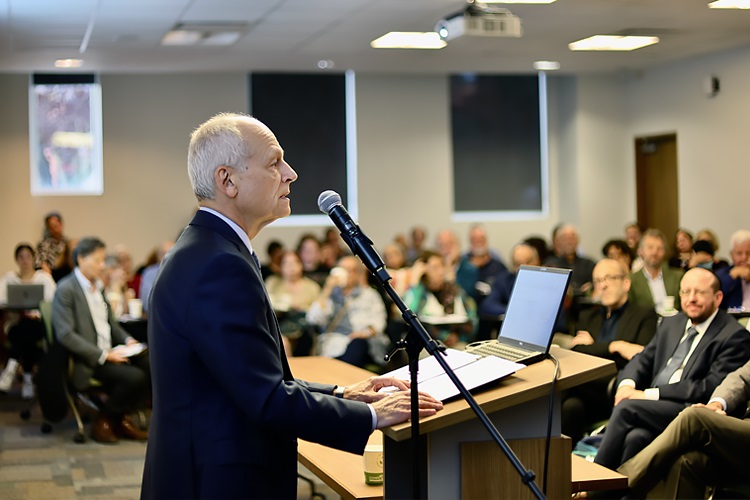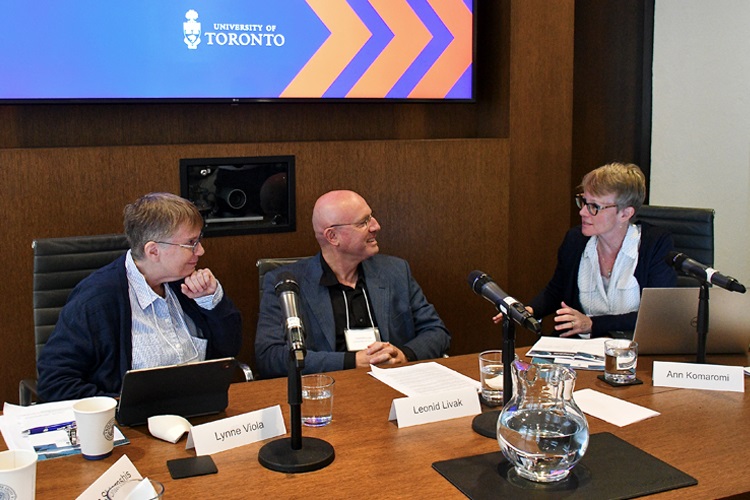The new Lab for the Global Study of Antisemitism recently hosted its inaugural Conference on Historical and Contemporary Antisemitism, marking its first academic event focused on the interdisciplinary study of antisemitism.
Launched in the Anne Tanenbaum Centre for Jewish Studies, the lab seeks to build a hub for research and teaching on antisemitism across academic disciplines and professional fields.
Laying the groundwork for future collaborations, the two-day conference brought together scholars, including U of T researchers, with extensive expertise in antisemitism studies.
They joined speakers from eight different universities and research institutes in America, Europe and Israel who shared their research with an audience of faculty members, postdoctoral researchers, and students from across the university, along with members of the public.
U of T President Meric Gertler introduced the event’s keynote speaker, Jeffery Kopstein, Dean’s Professor of Political Science at the University of California, Irvine, and a former U of T faculty member. Gertler shared his thoughts on the importance, the significance and the need for this event.
 “It’s now almost one year since the tragic and traumatic events that began with the attack by Hamas against Israel on October 7, 2023,” said Gertler. “Those events and their aftermath have since reverberated around the world, including here in Canada.
“It’s now almost one year since the tragic and traumatic events that began with the attack by Hamas against Israel on October 7, 2023,” said Gertler. “Those events and their aftermath have since reverberated around the world, including here in Canada.
“Sadly, one of the undeniable consequences has been a dramatic and deeply troubling upsurge in antisemitic acts and speech — a development that has shown itself across society, and quite dramatically at institutions of higher education, including the University of Toronto.”
Noting increasing concern about antisemitism on U of T’s three campuses prior to the past year, Gertler acknowledged that recent incidents “have caused undeniable harm to members of the Jewish community at U of T and to the university as a whole.
“I and the rest of the leadership of the university are fully committed to addressing this challenge, to help avoid further injury and to move our community forward.
After highlighting key actions the university will take, Gertler stressed that everyone within the U of T community has an important role to play in combatting antisemitism and all forms of racism.
Gertler also underscored the significance of ongoing scholarship and teaching with a goal of enhancing a deeper understanding of difficult questions, accommodating productive debate over contentious issues, and promoting the search for solutions.
“That is precisely why the work of the Anne Tanenbaum Centre for Jewish Studies, the new Lab for the Global Study of Antisemitism, and the scholars assembled here today is so important.”
Kopstein’s keynote address, “Antisemitism on Campus: A New Survey from the University of California,” examined student attitudes from four University of California campuses.
“How much antisemitism is on campus?” he asked. “Is it more than the rest of society? Is it less? What is the relationship of this antisemitism to anti-Israel attitudes, and how much is campus life affecting attitudes?”
Kopstein outlined how he and his team conducted surveys for undergraduate students of various disciplines, providing two sets of statements — one about attitudes towards Jews, the other towards Israel.
In the first set, students were asked to agree or disagree with statements such as “Jews don’t care what happens to anyone but their own kind,” and “Jews are more loyal to Israel than to the United States.”
The second set included statements such as “The Israelis are more responsible than the Palestinians for the past three years of violence in Israel, the West Bank and the Gaza Strip,” as well as “Israeli leaders are not sincere in their pursuit of peace.” He also examined results before and after the October 7, 2023, attack on Israel.
The second set included statements such as “The Israelis are more responsible than the Palestinians for the past three years of violence in Israel, the West Bank and the Gaza Strip,” as well as “Israeli leaders are not sincere in their pursuit of peace.”
He also examined results before and after the October 7, 2023, attack on Israel. In total, his study included approximately 1,600 non-Jewish students.
Sharing his results, Kopstein found antisemitism was present on all four campuses. For example, approximately nine per cent of respondents agreed in some way that Jews talk too much about the Holocaust. And as many as 25 per cent agreed that Jews are more loyal to Israel than to the United States. He also found that attitudes critical of Israel were even more prevalent and antisemitism and anti-Israel attitudes increased after the Hamas attack on October 7, 2023.
Kopstein also determined that such attitudes were not an after-effect of being at a university. “Whatever antisemitism students come with, they're getting before they arrive,” he said.
Still, he encouraged further studies, suggesting a similar study be conducted at U of T. And he stressed the need for further education and research. “There's no app, there's no algorithm,” he said. “It's very important that we study this dispassionately and scientifically to the best of our ability.”
Complementing Kopstein’s address were six panels that covered a wide of spectrum of issues related to antisemitism – navigating Jewishness in the contemporary world; antisemitism and healthcare; new developments in Jewish studies and antisemitism research; and the value of civil dialogue on campus as a way to reduce antisemitism.
Looking back to earlier in the century, three U of T professors provided vivid snapshots of Jewish-Russian history in the discussion, “Does it Feel Like the Old Country: Russian Antisemitic Tropes.”
Ann Komaromi, a professor in the Centre for Comparative Literature and the Department of Slavic & East European Languages & Cultures, discussed reactions to antisemitism in Jewish samizdat (an underground publishing network) in the USSR in the 1970s and ‘80s.
Lynne Viola, a University Professor Emerita with the Department of History, discussed the plight of Jews in the Jewish Soviet State, also known as the “Jewish NKVD” in the late 1930s.
The panel concluded with Leonid Livak, chair of the Department of Slavic & East European Languages & Cultures, who discussed the antisemitic persecution of Jewish members of the Russian community in wartime France in the 1940s.
For Anna Shternshis, director of the Anne Tanenbaum Centre for Jewish Studies and the J. Richard and Dorothy Shiff Chair in Jewish Studies , the conference was a resounding success.

“There was a rigorous level of conversation, learning about new research, and sharing with colleagues who are working on important projects,” she said. “This conference helped us think about the future of the field and gave us ideas on avenues of research to suggest to our graduate students.”
Ron Levi, the director of the Lab for the Global Study of Antisemitism and Distinguished Professor of Global Justice at the Munk School of Global Affairs & Public Policy and the Department of Sociology, cross-appointed to the Faculty of Law, was equally gratified.
“The event put the Lab for the Global Study of Antisemitism on the map as a new university-based hub for research, and for teaching and public-facing events rooted in rigorous scholarship, data and analysis,” he said.
“These are difficult times, and studying antisemitism is difficult work. The conference drew together scholarly experts from across fields. It’s the engagement and the desire to work on these issues collectively that made it a crucial scholarly event.”


